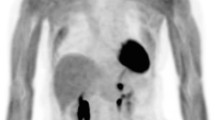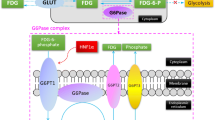Abstract
Objective
The purpose of the current study was to investigate the diagnostic performance of F-18 fluorodeoxyglucose (FDG) positron emission tomography/computed tomography (PET/CT) for the prediction of v-Ki-ras-2 Kirsten rat sarcoma viral oncogene homolog (KRAS) mutation in colorectal cancer (CRC) patients through a systematic review and meta-analysis.
Methods
The PubMed and EMBASE database, from the earliest available date of indexing through April 30, 2018, were searched for studies evaluating the diagnostic performance of F-18 FDG PET/CT for prediction of KRAS mutation in CRC patients.
Results
Across 9 studies (804 patients), the pooled sensitivity for F-18 FDG PET/CT was 0.66 (95% CI 0.60–0.73) without heterogeneity (I2 = 34.1, p = 0.14) and a pooled specificity of 0.67 (95% CI 0.62–0.72) without heterogeneity (I2 = 1.63, p = 0.42). Likelihood ratio (LR) syntheses gave an overall positive likelihood ratio (LR+) of 2.0 (95% CI 1.7–2.4) and negative likelihood ratio (LR−) of 0.5 (95% CI 0.41–0.61). The pooled diagnostic odds ratio (DOR) was 4 (95% CI 3–6). Hierarchical summary receiver operating characteristic (ROC) curve indicates that the areas under the curve were 0.69 (95% CI 0.65–0.73).
Conclusion
The current meta-analysis showed the low sensitivity and specificity of F-18 FDG PET/CT for prediction of KRAS mutation in CRC patients. The DOR was very low and the likelihood ratio scatter-gram indicated that F-18 FDG PET/CT might not be useful for prediction of KRAS mutation and not for its exclusion. Therefore, cautious application and interpretation should be paid to the F-18 FDG PET/CT for prediction of KRAS mutation in CRC patients.






Similar content being viewed by others
References
Siegel RL, Miller KD, Jemal A (2018) Cancer statistics, 2018 CA Cancer J Clin 68(1):7–30
Pao W, Wang TY, Riely GJ, et al. (2005) KRAS mutations and primary resistance of lung adenocarcinomas to gefitinib or erlotinib. PLoS Med 2(1):e17
Eberhard DA, Johnson BE, Amler LC, et al. (2005) Mutations in the epidermal growth factor receptor and in KRAS are predictive and prognostic indicators in patients with non-small-cell lung cancer treated with chemotherapy alone and in combination with erlotinib. J Clin Oncol 23(25):5900–5909
Jonker DJ, O’Callaghan CJ, Karapetis CS, et al. (2007) Cetuximab for the treatment of colorectal cancer. N Engl J Med 357(20):2040–2048
Karapetis CS, Khambata-Ford S, Jonker DJ, et al. (2008) K-ras mutations and benefit from cetuximab in advanced colorectal cancers. N Engl J Med 359(17):1757–1765
Lievre A, Bachet JB, Boige V, et al. (2008) KRAS mutations as an independent prognostic factor in patients with advanced colorectal cancer treated with cetuximab. J Clin Oncol 26(3):374–379
Amado RG, Wolf M, Peeters M, et al. (2008) Wild-type KRAS is required for panitumumab efficiency in patients with metastatic colorectal cancer. J Clin Oncol 26(10):1626–1634
Conlin A, Smith G, Carey FA, Wolf CR, Steele RJ (2005) The prognostic significance of K-ras, p53, and APC mutations in colorectal carcinoma. Gut 54(9):1283–1286
Blodgett TM, Meltzer CC, Townsend DW (2007) PET/CT: form and function. Radiology 242(2):360–385
Czernin J, Allen-Auerbach M, Schelbert HR (2007) Improvements in cancer staging with PET/CT: literature-based evidence as of September 2006. J Nucl Med 48(Suppl 1):78S–88S
Bar-Shalom R, Yefremov N, Guralnik L, et al. (2003) Clinical performance of PET/CT in evaluation of cancer: additional value for diagnostic imaging and patient management. J Nucl Med 44(8):1200–1209
Lonneux M (2008) FDG-PET and PET/CT in Colorectal Cancer. PET Clin 3(2):147–153
Yun J, Rago C, Cheong I, et al. (2009) Glucose deprivation contributes to the development of KRAS pathway mutations in tumor cells. Science 325(5947):1555-1559
Chen SW, Lin CY, Ho CM, et al. (2015) Genetic Alterations in Colorectal Cancer Have Different Patterns on 18F-FDG PET/CT. Clin Nucl Med 40(8):621–626
Oner AO, Budak ES, Yıldırım S, Aydın F, Sezer C (2017) The value of 18FDG PET/CT parameters, hematological parameters and tumor markers in predicting KRAS oncogene mutation in colorectal cancer. Hell J Nucl Med 20(2):160-165
Whiting PF, Rutjes AW, Westwood ME, et al. (2011) QUADAS-2: a revised tool for the quality assessment of diagnostic accuracy studies. Ann Intern Med 155(8):529–536
Glas AS, Lijmer JG, Prins MH, Bonsel GJ, Bossuyt PM (2003) The diagnostic odds ratio: a single indicator of test performance. J Clin Epidemiol 56(11):1129–1135
Thompson SG (1994) Why sources of heterogeneity in meta-analysis should be investigated. BMJ 309(6965):1351–1355
Deeks JJ, Macaskill P, Irwig L (2005) The performance of tests of publication bias and other sample size effects in systematic reviews of diagnostic test accuracy was assessed. J Clin Epidemiol 58(9):882–893
Hamza TH, van Houwelingen HC, Stijnen T (2008) The binomial distribution of meta-analysis was preferred to model within-study variability. J Clin Epidemiol 61(1):41–51
Reitsma JB, Glas AS, Rutjes AW, Scholten RJ, Bossuyt PM, Zwinderman AH (2005) Bivariate analysis of sensitivity and specificity produces informative summary measures in diagnostic reviews. J Clin Epidemiol 58(10):982–990
Rutter CM, Gatsonis CA (2001) A hierarchical regression approach to meta-analysis of diagnostic test accuracy evaluations. Stat Med 20(19):2865–2884
Lijmer JG, Mol BW, Heisterkamp S, et al. (1999) Empirical evidence of design-related bias in studies of diagnostic tests. JAMA 282(11):1061–1066
Stengel D, Bauwens K, Sehouli J, Ekkernkamp A, Porzsolt F (2003) A likelihood ratio approach to meta-analysis of diagnostic studies. J Med Screen 10(1):47–51
Leeflang MM, Deeks JJ, Gatsonis C & Bossuyt PM; Cochrane Diagnostic Test Accuracy Working Group (2008) Systematic Reviews of diagnostic test accuracy. Ann Intern Med 149(12):889–897
Chen SW, Chiang HC, Chen WT, et al. (2014) Correlation between PET/CT parameters and KRAS expression in colorectal cancer. Clin Nucl Med 39(8):685–689
Chen SW, Shen WC, Chen WT, et al. (2018) Metabolic Imaging Phenotype Using Radiomics of [18F]FDG PET/CT Associated with Genetic Alterations of Colorectal Cancer. Mol Imaging Biol 2018 Jun 12. https://doi.org/10.1007/s11307-018-1225-8. [Epub ahead of print]
Cho A, Jo K, Hwang SH, et al. (2017) Correlation between KRAS mutation and 18F-FDG uptake in stage IV colorectal cancer. Abdom Radiol (NY) 42(6):1621–1626
Kawada K, Nakamoto Y, Kawada M, et al. (2012) Relationship between 18F-Fluorodeoxyglucose accumulation and KRAS/BRAF mutations in colorectal cancer. Clin Cancer Res 18(6):1696–1703
Kawada K, Toda K, Nakamoto Y, et al. (2015) Relationship Between 18F-FDG PET/CT Scans and KRAS Mutations in Metastatic Colorectal Cancer. J Nucl Med 56(9):1322–1327
Krikelis D, Skoura E, Kotoula V, et al. (2014) Lack of association between KRAS mutations and 18F-FDG PET/CT in Caucasian metastatic colorectal cancer patients. Anticancer Res 34(5):2571–2579
Lee JH, Kang J, Baik SH, et al. (2016) Relationship Between 18F-Fluorodeoxyglucose Uptake and V-Ki-Ras2 Kirsten Rat Sarcoma Viral Oncogene Homolog Mutation in Colorectal Cancer Patients: Variability Depending on C-Reactive Protein Level. Medicine (Baltimore) 95(1):e2236
Lovinfosse P, Koopmansch B, Lambert F, et al. (2016) 18F-FDG PET/CT imaging in rectal cancer: relationship with the RAS mutational status. Br J Radiol 89(1063):20160212
Mao W, Zhou J, Zhang H, et al. (2018) Relationship between KRAS mutations and dual time point 18F-FDG PET/CT imaging in colorectal liver metastases. Abdom Radiol (NY) 2018 Aug 24. https://doi.org/10.1007/s00261-018-1740-8. [Epub ahead of print]
Forrester K, Almoguera C, Han K, Grizzle WE, Perucho M (1987) Detection of high incidence of K-ras oncogenes during human colon tumorigenesis. Nature 327(6120):298–303
Caicedo C, Garcia-Velloso MJ, Lozano MD, et al. (2014) Role of [18F]FDG PET in prediction of KRAS and EGFR mutation status in patients with advanced non-small-cell lung cancer. Eur J Nucl Med Mol Imaging 41(11):2058–2065
Jadvar H, Alavi A, Gambhir SS (2009) 18F-FDG uptake in lung, breast, and colon cancers: molecular biology correlates and disease characterization. J Nucl Med 50(11):1820–1827
Lee SM, Bae SK, Jung SJ, Kim CK (2015) FDG uptake in non-small cell lung cancer is not an independent predictor of EGFR or KRAS mutation status: a retrospective analysis of 206 patients. Clin Nucl Med 40(12):950–958
Takamochi K, Mogushi K, Kawaji H, et al. (2017) Correlation of EGFR or KRAS mutation status with 18F-FDG uptake on PET-CT scan in lung adenocarcinoma. PLoS One 12(4):e0175622
Ikeno Y, Seo S, Iwaisako K, et al. (2018) Preoperative metabolic tumor volume of intrahepatic cholangiocarcinoma measured by 18F-FDG-PET is associated with the KRAS mutation status and prognosis. J Transl Med 16(1):95
Funding
This research did not receive any specific grant from any funding agency in the public, commercial, or not-for-profit sector.
Author information
Authors and Affiliations
Contributions
Kim SJ and Pak K contributed in protocol/project development. Kim SJ, Kim K, and Pak K contributed in data collection or management. Kim SJ and Kim K contributed in data analysis. Kim SJ, Pak K, and Kim K contributed in manuscript writing/editing.
Corresponding author
Ethics declarations
Conflict of interest
The authors declare that there is no conflict of interest that could be perceived as prejudicing the impartiality of this study.
Ethical approval
Institutional review board approval was not required because we only performed data analysis based on the published studies.
Informed consent
Written informed consent was not required for this study because it is a meta-analysis based on the studies that have been published.
Rights and permissions
About this article
Cite this article
Kim, SJ., Pak, K. & Kim, K. Diagnostic performance of F-18 FDG PET/CT for prediction of KRAS mutation in colorectal cancer patients: a systematic review and meta-analysis. Abdom Radiol 44, 1703–1711 (2019). https://doi.org/10.1007/s00261-018-01891-3
Published:
Issue Date:
DOI: https://doi.org/10.1007/s00261-018-01891-3




